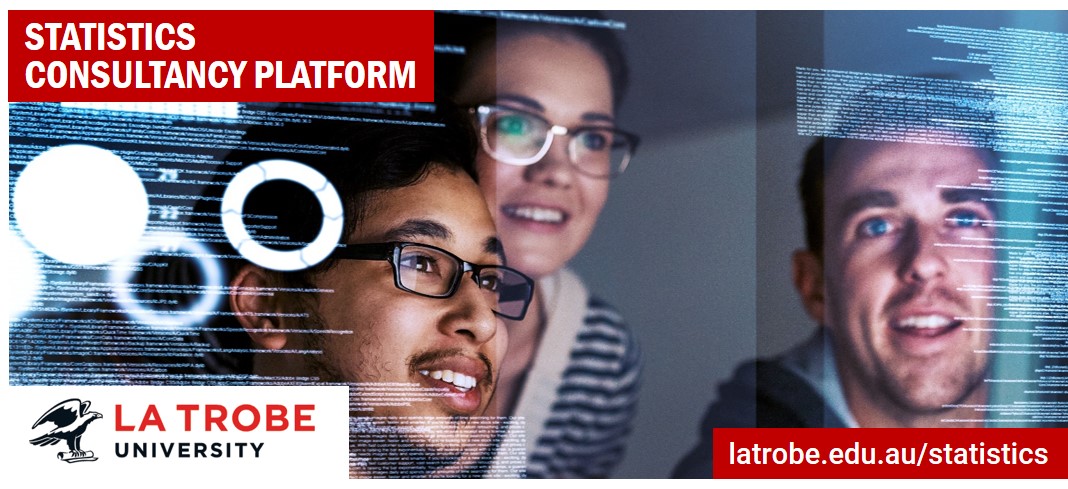5 content providers found
Keywords: R or university or Ecology
-

Sydney Informatics Hub
We are a core research facility of the University of Sydney. We provide support, training, and...
13 training material9 upcoming event (139 past event)Sydney Informatics Hub https://www.sydney.edu.au/research/facilities/sydney-informatics-hub/workshops-and-training/training-calendar.html https://dresa.org.au/content_providers/sydney-informatics-hub We are a core research facility of the University of Sydney. We provide support, training, and expertise in research data management, statistics, data science, software engineering, simulation, visualisation, bioinformatics, and research computing. /system/content_providers/images/000/000/009/original/University_of_Sydney_logo.png?1633565253 -

La Trobe University Statistics Consultancy Platform
The La Trobe University Statistics Consultancy Platform enables and accelerates research programs...
4 upcoming event (18 past event)La Trobe University Statistics Consultancy Platform https://www.latrobe.edu.au/statistics https://dresa.org.au/content_providers/la-trobe-university-statistics-consultancy-platform The La Trobe University Statistics Consultancy Platform enables and accelerates research programs by providing statistical advice about research methods, experimental design and data analysis for projects. The services available to industry collaborators, researchers and Graduate Research students include: * statistical analysis of data. * statistical support for grant applications. * guidance on designing a study, survey or questionnaire. * advice on data collection methods. * training in a particular area of statistics. * advice on how to model statistical data. * access to specialist statistical software. * help with communicating statistical findings. For further information about the Statistics Consultancy Platform, please contact: Statistics.Consultancy@latrobe.edu.au /system/content_providers/images/000/000/014/original/Stats_mug.jpg?1637808130 -

EcoCommons
A Planet RDC project, EcoCommons is building a collaborative commons that is developing...
8 training materialEcoCommons https://www.ecocommons.org.au/ https://dresa.org.au/content_providers/ecocommons A Planet RDC project, EcoCommons is building a collaborative commons that is developing ecological modelling tools. It currently provides; access to point-and-click species distribution modelling (SDM) tools, projections of how those distributions might change as the climate warms, access to a variety of spatial data grids (rasters), and API connection to records from the Atlas of Living Australia. /system/content_providers/images/000/000/034/original/ecocommons-logo.png?1711521620 -

Open Ecoacoustics
A Planet RDC project, the vision of Open Ecoacoustics is to enable open science and conservation...
6 training materialOpen Ecoacoustics https://openecoacoustics.org/ https://dresa.org.au/content_providers/open-ecoacoustics A Planet RDC project, the vision of Open Ecoacoustics is to enable open science and conservation through the development and promotion of open access ecoacoustics technologies, methodologies and standards. We provide a dedicated ecoacoustics platform that is open to everyone, so that it can aggregate and share data, analyses and tools, and interoperate with downstream services. We support FAIR data by developing standardised metadata and third party analyses by moving to flexible workflow technologies (PBS, docker). We accelerate data analysis by publishing a shared repository of annotated datasets and recognisers. We interface to other systems, including TERN, ALA, EcoCommons and citizen science sites, through services and shared tools. /system/content_providers/images/000/000/035/original/Open_Ecoacoustics_logo.png?1712032933 -

Atlas of Living Australia
The Atlas of Living Australia (ALA) is a collaborative, digital, open infrastructure that pulls...
0 upcoming event (1 past event)Atlas of Living Australia https://www.ala.org.au/ https://dresa.org.au/content_providers/atlas-of-living-australia The Atlas of Living Australia (ALA) is a collaborative, digital, open infrastructure that pulls together Australian biodiversity data from multiple sources, making it accessible and reusable. The ALA helps to create a more detailed picture of Australia’s biodiversity for scientists, policymakers, environmental planners and land managers, industry and the general public and enables them to work more efficiently. The ALA is the Australian node and a full voting member of GBIF – the Global Biodiversity Information Facility – an international network and data infrastructure funded by the world’s governments and aimed at providing anyone, anywhere, open access to data about all types of life on Earth. /system/content_providers/images/000/000/017/original/ALA_Logo_Inline_CMYK.jpg?1652413583